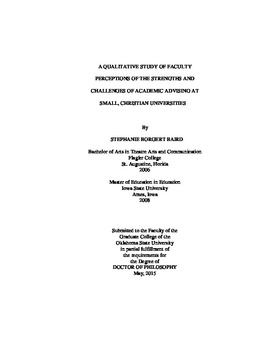| dc.contributor.advisor | Kearney, Kerri S. | |
| dc.contributor.author | Baird, Stephanie Elizabeth | |
| dc.date.accessioned | 2016-04-15T21:49:10Z | |
| dc.date.available | 2016-04-15T21:49:10Z | |
| dc.date.issued | 2015-05 | |
| dc.identifier.uri | https://hdl.handle.net/11244/33389 | |
| dc.description.abstract | As student retention, persistence, and degree completion became "hot topics" in higher education, research on the influence from academic advising models and practices emerged. However, there is little research on faculty advisor perceptions of models, specifically at small, Christian universities. Such information improves academic advising and, in turn, retention, persistence, and degree completion at these institutions. Consequently, the purpose of the study was to explore faculty perceptions of the strengths and challenges of current systems of academic advising at small, Christian universities | |
| dc.description.abstract | This case study was conducted at three Christian universities and resulted in numerous findings for the individual institutions and as a collective case study. The four findings from the first institution were that faculty advisors knew their institution, industries, and students very well, but were busy with several responsibilities, saw the function and process of academic advising as different from that of enrollment, and were not engaged in general education courses. The first two findings from the second institution were that faculty accessibility and good customer service were vital aspects of effective academic advising and that personal relationships among faculty advisors and advisees contributed to student success. The second two findings were that FERPA slowed down the advising and customer service processes for students and that faculty advisors were busy and had little time or ability to advise students. The three findings at the third institution were that faculty advisors enjoyed interacting with their student advisees and wanted to know them well and help them succeed. They also felt limited by the technological systems that they used to enroll students and had many responsibilities that left little time for academic advising. | |
| dc.description.abstract | Thus, the two findings for the collective case study consisted of one perceived strength and one perceived challenge. The perceived strength was that faculty advisors knew their students and enjoyed interacting with them, while the perceived challenge was that they were busy with multiple responsibilities and did not have the amount of time they wanted or needed to advise their students. | |
| dc.format | application/pdf | |
| dc.language | en_US | |
| dc.rights | Copyright is held by the author who has granted the Oklahoma State University Library the non-exclusive right to share this material in its institutional repository. Contact Digital Library Services at lib-dls@okstate.edu or 405-744-9161 for the permission policy on the use, reproduction or distribution of this material. | |
| dc.title | Qualitative study of faculty perceptions of the strengths and challenges of academic advising at small, Christian universities | |
| dc.contributor.committeeMember | Krumm, Bernita L. | |
| dc.contributor.committeeMember | Self, Mary Jo | |
| dc.contributor.committeeMember | Wanger, Stephen P. | |
| osu.filename | Baird_okstate_0664D_13860.pdf | |
| osu.accesstype | Open Access | |
| dc.type.genre | Dissertation | |
| dc.type.material | Text | |
| thesis.degree.discipline | Educational Leadership and Policy Studies | |
| thesis.degree.grantor | Oklahoma State University | |
